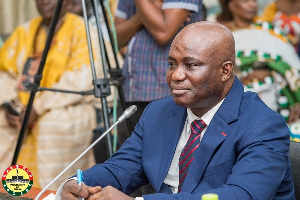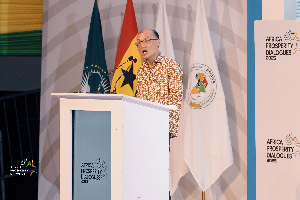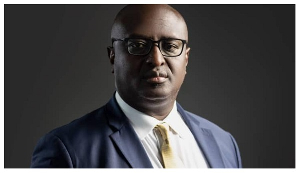Accra, Nov. 14, GNA - Ghana would definitely meet the Millennium Development Goal (MDG) target of reducing by half the number of people without access to water by 2015, Mr Hackman Owusu-Agyemang, Minister of Water Resources, Works and Housing, said on Tuesday.
Speaking at the launch of the United Nations Development Programme (UNDP) 2006 Human Development Report (HDR), he said Ghana was poised to achieve at least 85 per cent coverage of water for its people before the year 2015.
This, he noted, was not by fabrication, but by going according to the available statistics on access to water in Ghana. This year's HDR focuses on water and sanitation and it is titled, "Beyond Scarcity: Power, Poverty and Global Water Crisis". The report has six chapters, with the first half focusing on how important water is for life and the other half on the essentials of water for livelihood.
There are six sub-themes namely, "The Crisis in Water and Sanitation; Water for Human Consumption; The Sanitation Deficit; Water, Vulnerability and Risk; Water and Agriculture and Trans-boundary Waters".
Mr Owusu-Agyemang said the country's water policy, which made the accessibility of water a basic human right has been completed "and if we are able to increase water coverage in the rural areas we would make it in achieving the MDG target".
He said under the new water policy all water systems would take into account all rural areas through which the system passed and provide them with potable water before supplying the targeted urban area. Mr Owusu-Agyemang said investments in the water sector did not often reflect in the national budget because they came in the form of loans and grants.
He said there would be improvement in water supply to the people in eastern Accra within the next three months while arrangements were far advanced for the supply of water from Weija to residents at Okponglo to Madina and beyond.
"We are working on the construction of Kpong Two as the ultimate solution to the water problem in the eastern part of Accra." Mr Owusu-Agyemang said sanitation was one big problem that the Government was working hard to solve and the Ministry of Local Government, Rural Development and Environment was working around the clock on it.
Mr Daouda Toure, United Nations Resident Coordinator, said the HDR, though the flagship publication of the UNDP; was an advocacy tool through which governments were expected to work towards achieving change and ensuring longer and healthier lives for the people.
He said the Report made water and sanitation the central focus in the achievement of the MDGs because to half child mortality or erode gender inequalities, for instance, there was the need for water and good sanitation.
"Women and girls continue to spend more than four hours in search of water whilst the men and the boys use that time to educate themselves or do other things," he said.
Mr Toure called for increased investment in the water sector saying that the Report recommended that governments should devote at least a percentage of the GDP to the provision of water and sanitation. He said the HDR was not a beauty contest or a league table competition that one country would feel that it had done better than the other. Rather, the Report targeted ensuring an improvement in the quality of life of all people.
Mr Lukman Y. Salif, Chief Executive Officer, Wastecare Associate, who presented the key findings of the HDR, said the main message of discussion on the first theme; "Ending the Crisis in Water and Sanitation", was that safe water and sanitation held the key to improving the lot of billions of un-served people, whose capabilities were stunted by lack of water and improved sanitation.
He said human cost as analysed by the authors and contributors was very high and accounted for 1.8 million child deaths every year due to diarrhoea alone. The toll on school going pupils was 443 million school days lost each year due to water-related ailments.
Mr Salif said the Report should remind Ghanaians to look beyond the numbers and consider the drudgery and human suffering that ensued due to the poor situations of water and sanitation.
"In spite of 1.1 billion people lacking access to water and 2.6 billion people lacking access to improved sanitation, the Report gives hope that the challenges can be overcome through renewed efforts and action."
Mr Salif said learning from the past, the HDR 2006 emphasizes that the developed economies of the United States of America and Europe were where they were now because at the turn of the 20th century they took on the water and sanitation challenge.
"Social reformers, physicians, municipal leaders and industrialist formed coalitions that forced governments to reconsider attention to water and sanitation issues. Preventive medicine through improved water and sanitation became the focus," he said, and urged developing countries to also take up the challenge now to help to give more meaning to life.
Mr Salif said another important finding by the Report was that water demand was growing twice as fast as population and that water stress was increasing.
Evidence of this includes ecological stress, drying up of rivers, shrinking lakes, sinking ground water tables and climate change increasing uncertainty in availability of water. 14 Nov. 06
General News of Tuesday, 14 November 2006
Source: GNA
















